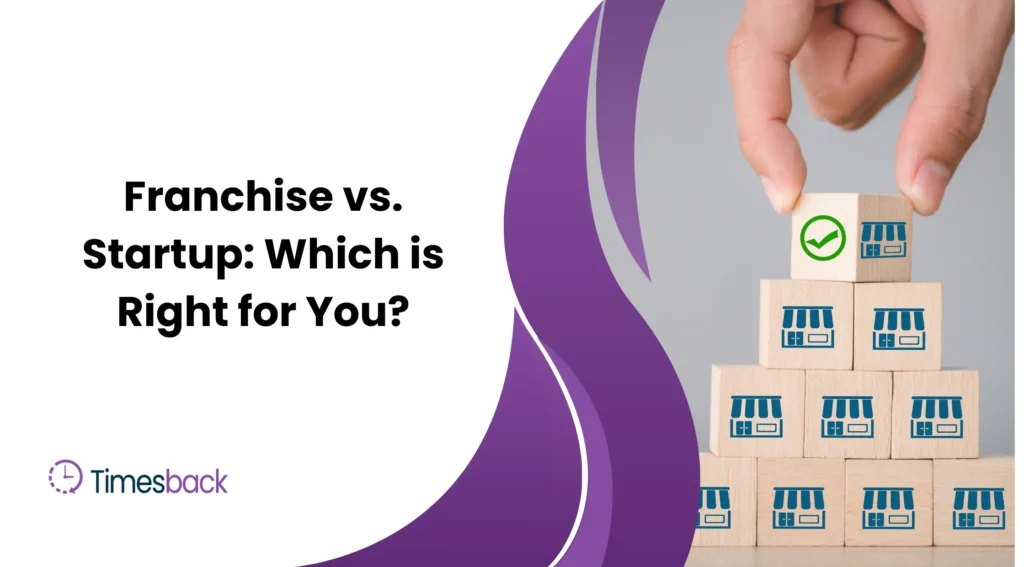Franchise vs. Startup: Which is Right for You?

When embarking on the journey of entrepreneurship, one of the pivotal questions you’ll face is Franchise vs. Startup.
Anúncios
Each path offers distinct opportunities and challenges, shaping not only how your business will grow, but also how you’ll experience the journey.
Both models come with their unique advantages, depending on your personal goals, risk tolerance, and desired level of control.
In this article, we’ll break down the key elements of each model to help you determine which path aligns best with your entrepreneurial vision.
Stability vs. Innovation: What Drives You?
Anúncios
At the core of the Franchise vs. Startup debate is the fundamental question: Do you value stability or innovation more?
Franchises provide a sense of security that many first-time business owners find appealing. You’re not starting from scratch, but rather leveraging an already successful business model.
The systems, processes, and brand reputation are already in place, significantly reducing the risk.
However, this comes at the cost of creativity and autonomy. As a franchisee, you are bound by the franchisor’s guidelines, leaving little room for innovation.
Conversely, startups give you the freedom to create something entirely new.
If you’re passionate about problem-solving, disrupting industries, and making decisions independently, a startup allows you to shape every aspect of the business.
But, with this freedom comes the reality of navigating unproven waters and shouldering greater risks.
+ 10 Ways to Boost Your Startup’s Visibility Online
Data-Driven Insights into Risk
The statistics bear out these differences. A study by the Small Business Administration (SBA) reports that 80% of franchises are still operating after five years, compared to just 50% of independent startups.
While this highlights the relative safety of franchising, it also underscores the volatility of startups and the importance of thorough planning and adaptability.
Table 1: Franchise vs. Startup – Key Factors to Consider
| Factor | Franchise | Startup |
|---|---|---|
| Risk | Lower, due to established brand | Higher, as it’s untested |
| Control | Limited, follows franchisor’s rules | Complete autonomy |
| Initial Investment | Higher upfront costs (franchise fees) | Varies, but typically lower |
| Ongoing Support | Extensive training and assistance | Minimal, depending on individual network |
Cost Structures: Upfront and Ongoing Investments

The financial aspect is often the most decisive factor for aspiring entrepreneurs. Franchises tend to have higher upfront costs.
Aside from the franchise fee, which can range from $20,000 to $50,000 or more depending on the brand, you’ll also need to cover real estate, equipment, and royalties that can range from 5% to 10% of your revenue.
These ongoing costs, however, provide access to the franchise’s established brand, marketing strategies, and operational support.
For example, buying into a popular fast-food chain like Subway can cost $150,000 to $300,000 but offers immediate brand recognition and established customer trust.
Startups, on the other hand, allow for greater financial flexibility. With a startup, you determine the level of initial investment, which can vary widely depending on the business model.
While some startups require only a few thousand dollars to launch, others may require significant capital for product development, marketing, and operational expenses.
Importantly, startups don’t involve ongoing royalty payments, allowing owners to reinvest profits directly into their business.
+ What to know before buying a franchise?
Operational Control and Business Flexibility

Another vital consideration in the Franchise vs. Startup decision is how much control you want over daily operations and long-term strategy.
Franchising involves adhering to a set of rules and practices established by the franchisor.
This includes everything from product offerings and marketing to the layout of your physical space.
The advantage here is that you benefit from the franchisor’s experience and refined processes, which often lead to operational efficiency and reduced decision fatigue.
The trade-off, however, is a lack of flexibility. If you’re the type of entrepreneur who values creative control and the ability to pivot quickly in response to market changes, franchising may feel too restrictive.
Startups, in contrast, give you complete freedom to build the business exactly as you envision it.
You control every decision, from the business name and branding to the products or services you offer.
This level of freedom is ideal for those with a strong vision and willingness to adapt as the market demands.
However, it also means bearing the brunt of every challenge that comes with running an untested business, from customer acquisition to managing cash flow.
Table 2: Franchise vs. Startup – Control and Flexibility
| Aspect | Franchise | Startup |
|---|---|---|
| Decision-Making | Franchisor has final say | Entrepreneur has full control |
| Branding | Must adhere to franchise guidelines | Customizable, flexible |
| Flexibility in Growth | Limited, follows set guidelines | Unlimited, can scale or pivot |
Time Commitment: Structured vs. Dynamic Workflows
The time investment for a Franchise vs. Startup also varies significantly.
In a franchise, much of the legwork around business setup is handled by the franchisor, providing established timelines and structures that streamline operations.
This means that from the day you sign your franchise agreement, there’s a roadmap in place that includes training, support, and ongoing assistance.
This is ideal for entrepreneurs who prefer structure and predictability in their day-to-day operations.
The structured environment of a franchise enables quicker ramp-up times compared to most startups.
A startup, on the other hand, requires a more dynamic and hands-on approach.
From building the initial business model to testing product-market fit, the early stages of a startup often involve long hours and unpredictable challenges.
There is no set playbook, and the entrepreneur must be ready to wear multiple hats and adapt quickly.
If you thrive on a fast-paced, ever-changing environment, a startup could offer the excitement and sense of ownership you desire.
However, the demands of a startup can be overwhelming, especially for first-time entrepreneurs unprepared for the time and energy it takes to succeed.
Scalability and Long-Term Potential
When thinking about the Franchise vs. Startup decision, it’s important to consider your long-term vision.
Franchises are generally easier to scale because the business model is already proven.
Successful franchisees can often expand by opening additional units, with the benefit of continuing support from the franchisor. This can lead to significant growth without the need for constant reinvention.
Startups, however, have the potential for exponential growth, particularly in innovative sectors like technology or green energy.
If your product or service fills an unmet market need, the potential for scaling is vast.
The trade-off is that scaling a startup often requires raising capital, navigating competition, and overcoming market entry barriers.
Startups also carry the risk of failure if the product or service doesn’t resonate with customers.
Conclusion: Franchise vs. Startup — What’s Right for You?
Deciding between a Franchise vs. Startup boils down to understanding your personal risk tolerance, financial capabilities, and long-term goals.
Franchises offer stability, a tested business model, and ongoing support, but come at the cost of creative control and higher upfront investment.
Startups, while riskier, provide the opportunity for innovation, flexibility, and potentially higher returns.
The path you choose should reflect your personality, values, and what you want out of your entrepreneurial journey.
For those seeking a more stable, structured, and supported venture, franchising offers a ready-made business with reduced risks.
But if you’re drawn to innovation, have a strong entrepreneurial spirit, and are prepared to take on higher risks for greater rewards, starting your own business might be the perfect choice.
